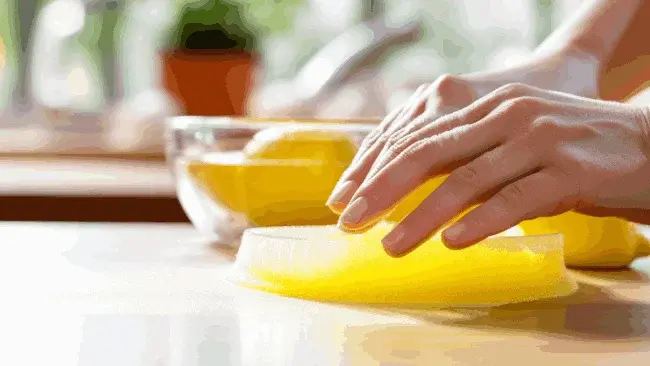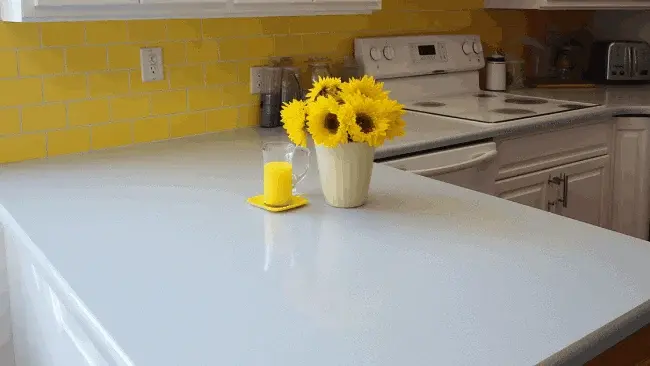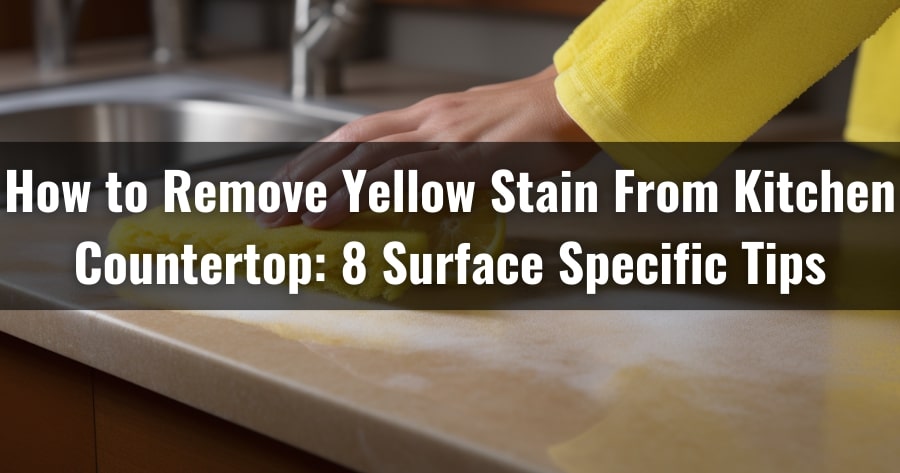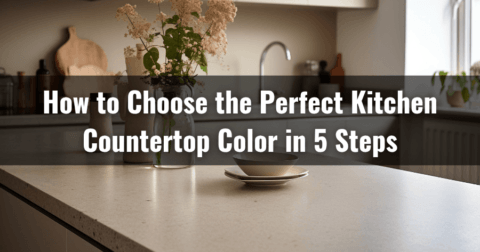Yellow stains on countertops are often the main enemy of a pristine kitchen. Whether your kitchen centerpiece is made of quartz, marble, granite, or another material, the persistence of these stains can be frustrating.
To remove yellow stains from kitchen countertops, mix two tablespoons of white vinegar with one tablespoon of baking soda in a cup of warm water. Apply the mixture to the stained area, let it sit for 30 minutes, then scrub with a scouring pad. Rinse with hot water once the stain lifts, and repeat if necessary.
Here, we will explore how to remove yellow stains from various kitchen countertops, restoring their pristine beauty. So, put away your cleaning supplies for now and prepare to uncover the secrets that will return the luster to your countertop.
Jump to Section
How to Remove Yellow Stain From Kitchen Countertop: Surface-based Approaches
Kitchen countertops often get yellow stains due to constant exposure to food, drinks, and other kitchen spills. These stains can be particularly stubborn and may require specific techniques and products for removal.

Here are some surface-based approaches you can try:
Each type of countertop may have different levels of susceptibility to staining, so it is essential to use specific stain removal methods. Let’s dive into the details of each surface type and how you can get rid of those yellow stains.
01: Quartz Countertops
You can create a cleaning solution using common household ingredients to remove yellow stains from your quartz kitchen countertop effectively.
Combine two tablespoons of white vinegar, one tablespoon baking soda, and a cup of warm water to make the solution. Thoroughly mix it and apply directly to the yellow stains on the countertop.
Let the cleaning mixture sit for at least half an hour to penetrate and work on the stains. After the waiting period, gently scrub the stained area using a scouring pad. Once the stain has lifted, rinse the kitchen countertop with hot water. If stubborn stains persist, repeat the process as needed.
02: Marble Countertops
If you have marble kitchen countertops, addressing yellow stains helps maintain their beauty. To tackle these stains, start by cleaning spills immediately using a mixture of water and mild soap.
Apply the solution to the stained area and gently scrub with a soft cloth or sponge. Marble is sensitive, so avoid using abrasive materials that could scratch it. Regular maintenance is also important, including proper sealing to prevent future stains.
03: Wooden Countertops
To effectively remove yellow stains from wooden kitchen countertops, follow two practical steps for a pristine, stain-free surface.
For light stains, mix mild soap and water. Apply a soft cloth to the stained area and scrub gently. If the stains are more stubborn, create a paste with salt and lemon juice and scrub the affected areas. Keep an eye out for excessive moisture during the cleaning process.
Maintaining and oiling the wooden surface is crucial for maintaining its luster and protecting it from future stains. This will also help to prevent the wood from drying out and cracking.
04: Granite Countertops
To effectively remove yellow stains from granite kitchen countertops, create a paste by combining baking soda and water. This simple mixture can help lift surface stains without causing any damage to your granite countertop.
Once you have made the paste, apply it to the stained area, covering the entire stain. Then, cover the area with plastic wrap and let it sit overnight. The next day, wipe away the paste using a soft cloth or sponge.
05: Laminate Countertops

Consider using a basic kitchen cleaner or baking soda paste to remove yellow stains from laminate kitchen countertops. Apply the cleaner or paste with a soft cloth or sponge and gently scrub the stained area. Avoid using excessive force or abrasive materials to prevent damage to the laminate surface.
You should be cautious of hot objects, as laminate can be sensitive to heat and may get burned. We recommend always following the manufacturer’s instructions for laminate kitchen countertop cleaning and maintenance.
06: Stainless Steel Countertops
To remove yellow stains from your stainless steel kitchen countertop, gentle cleaning with dish soap, water, and a microfiber cloth is recommended. This method helps maintain the integrity of the stainless steel while effectively removing stains.
A mild abrasive can be applied for hard water or rust stains, ensuring you scrub with the grain.
07: Concrete Countertops
Start by sealing the surface to protect against future stains. Then, make thick paste using baking soda & a small amount of water and apply it to the stained areas.
Now, gently scrub the stains with a toothbrush, focusing on the affected areas. After that, rinse the countertop with water and wipe it thoroughly with a clean cloth.
Concrete countertops are porous, so it’s essential to reapply the sealer every six months to maintain their durability.
08: Tile Countertops
Cleaning and removing yellow stains from tile countertops, especially in the grout lines, require a targeted approach.
For glazed tile surfaces, you can use a general cleaning solution. But, it’s best to use a grout cleaner specifically designed for this purpose regarding stains in grout lines.
Apply the grout cleaner to the stained areas and use a tile brush or an old toothbrush to scrub the grout lines thoroughly. Ensure the cleaner penetrates the grout, then rinse the area with water.
Regularly cleaning the tile surface and grout lines will help prevent the build-up of stains and maintain the aesthetic appeal of your tile kitchen countertops.
Note: To avoid any potential damage to your kitchen countertop material, always test it on a small, inconspicuous area first. You should avoid using harsh chemicals or abrasive scrubbers, as they can damage the surface of your countertop.
FAQ’s: How to Remove Yellow Stain From Kitchen Countertop
Why do kitchen countertops develop yellow stains?
Kitchen countertops can develop yellow stains due to various factors, such as low-quality materials, improper cleaning, and lack of maintenance. Factors like high usage, contact with hot objects, exposure to metal, and UV damage can also contribute to discoloration.
Furthermore, improper cleaning agents and neglect of regular maintenance can accumulate chemicals and dirt, further increasing staining risks.
How frequently should I clean my kitchen countertops?
Most kitchen experts recommend wiping down countertops daily with a mild dish soap and warm water solution. But, high-traffic areas and surfaces prone to spills may require daily cleaning with a disinfectant to keep them looking their best and hygienic.

It’s also crucial to consider the material of your countertops. Porous materials like marble or granite should be cleaned regularly, but harsh chemicals should be avoided to prevent damage to the sealant. Wood countertops may require less frequent cleaning, but periodic oiling is necessary to maintain luster.
How do I know if my kitchen countertop needs professional restoration?
Consider professional restoration if your kitchen countertop shows deep stains, scratches, or a dull appearance. While regular cleaning and DIY solutions can maintain the countertop’s condition, there are instances where more intensive treatment is necessary.
Professional restoration experts have the expertise and specialized tools to assess the severity of the damage and recommend appropriate measures. If your countertop seems beyond repair or you’ve tried various methods without success, it’s advisable to consult with professionals.
Conclusion
You can effectively banish yellow stains by understanding the unique needs of every countertop type. Quartz countertops resist stains, while marble is delicate and porous, requiring special care.
Once you’ve successfully tackled stains, you must prioritize preventive measures, appropriate cleaning solutions, and regular maintenance to keep your countertops looking great.
This way, your kitchen environment will sparkle with cleanliness and radiate diligently maintained surfaces’ longevity.
Your countertops will testify to the beauty of a well-cared-for culinary space. Embrace the importance of maintaining your countertops and revel in their pristine, blemish-free state.





